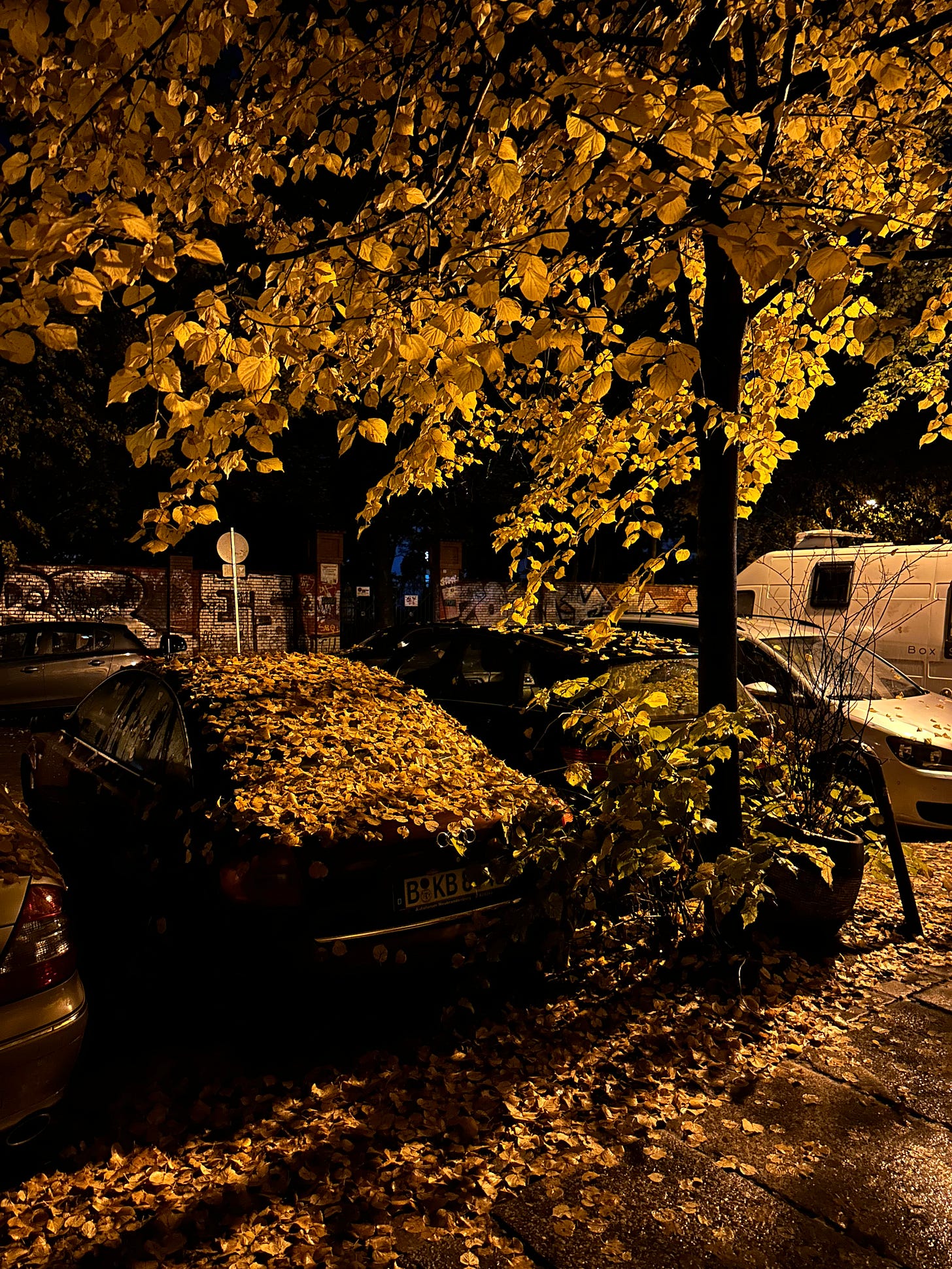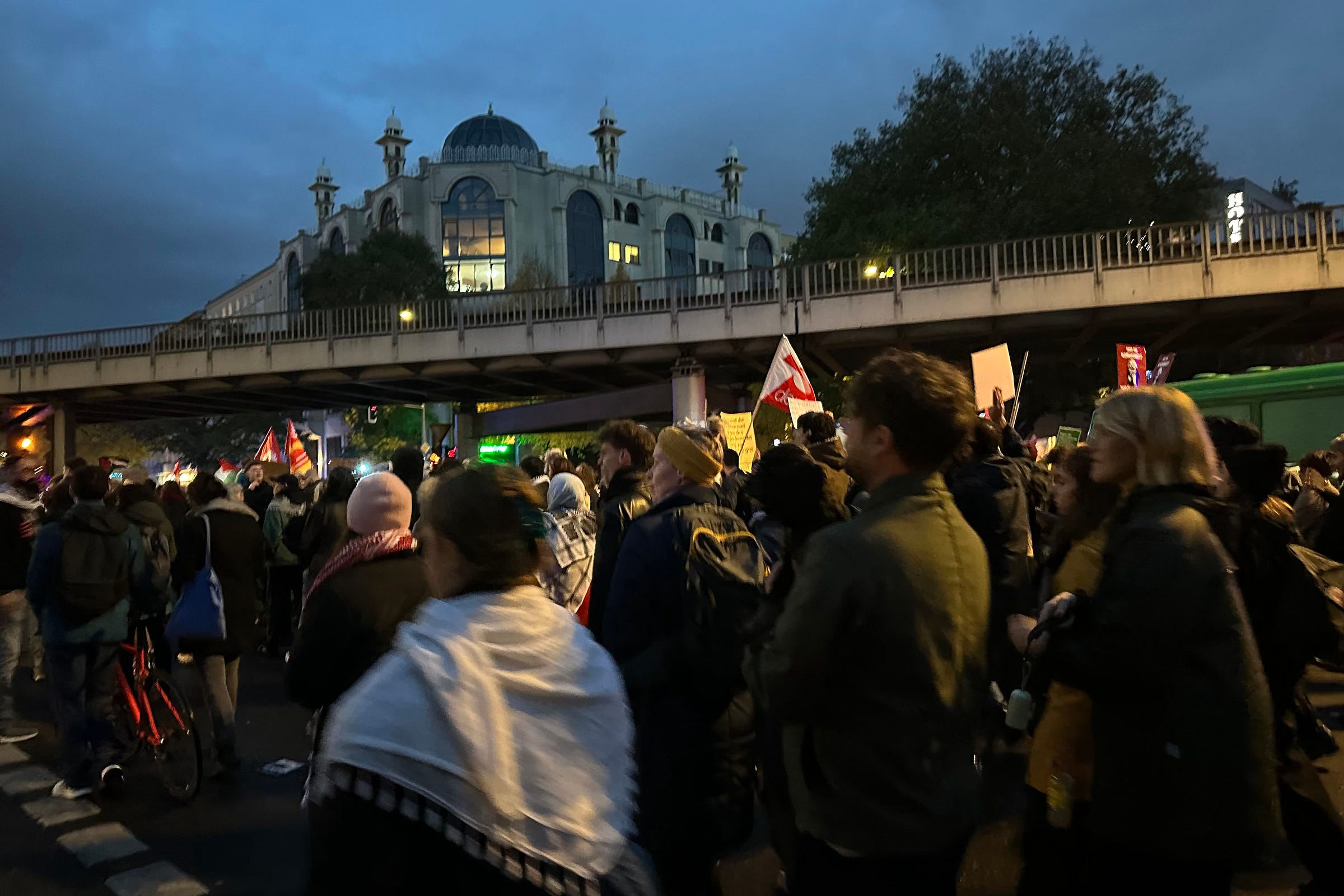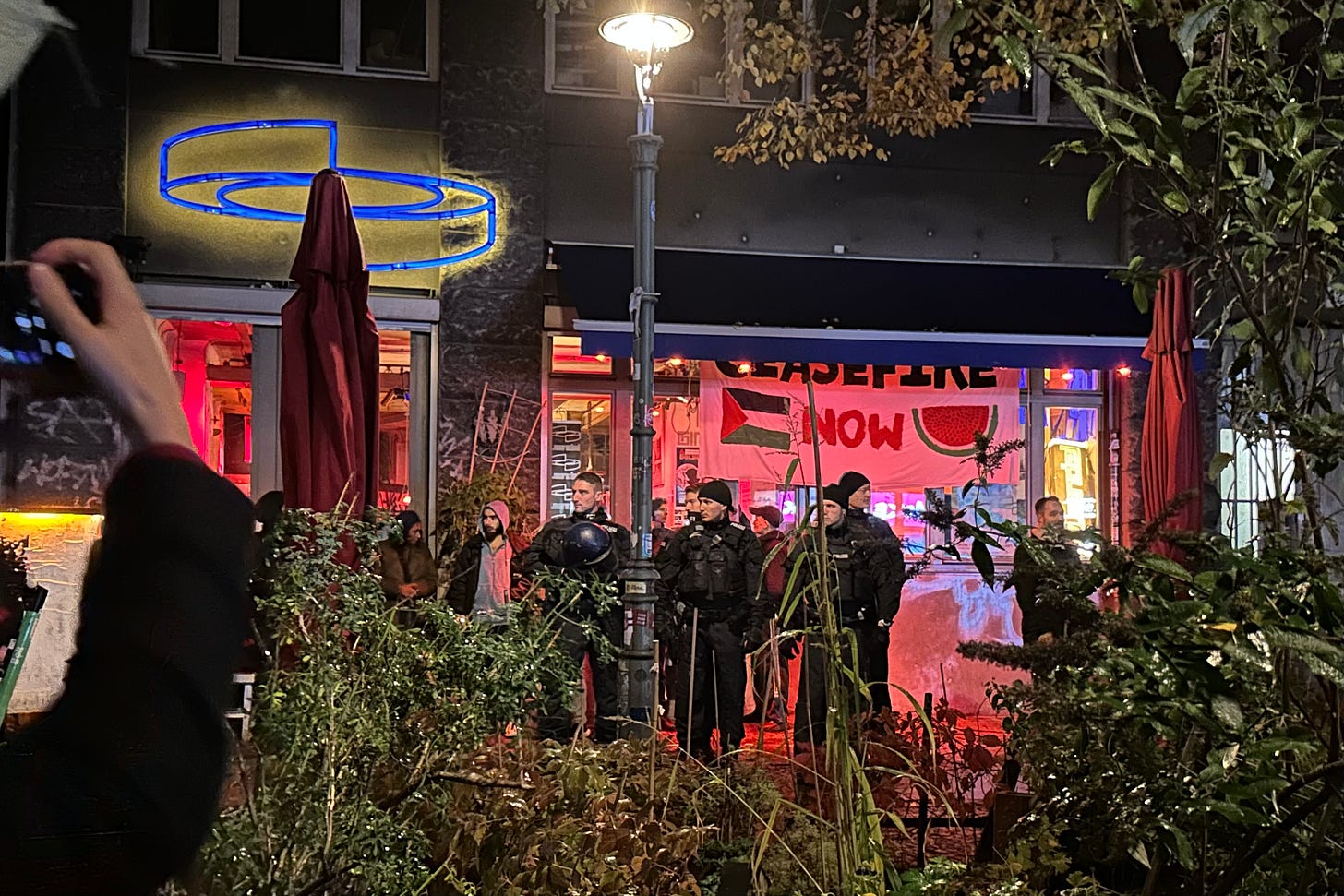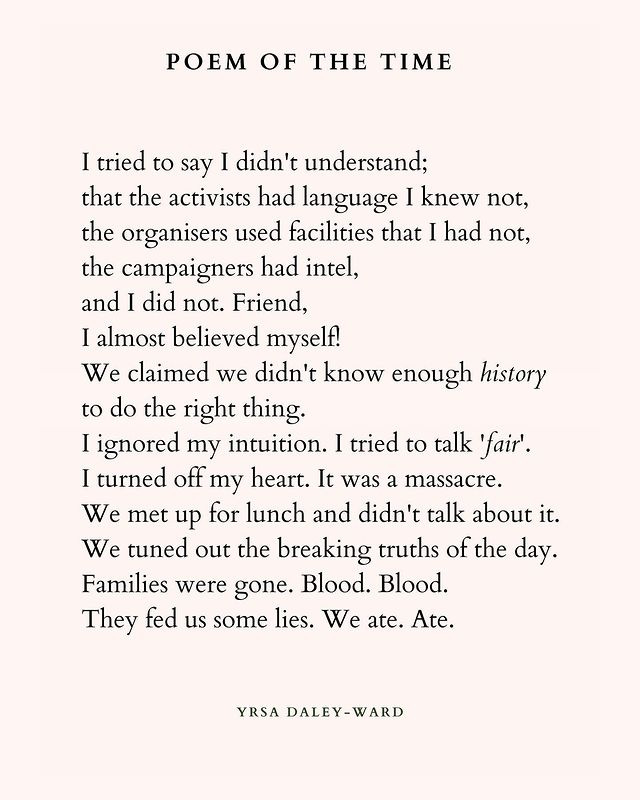However you found your way here, welcome! I’m Emily, and I write letters about how we seek and tell stories to make sense of a changing world and our place in it.
Soon after I wrote this letter, it was reported that the Israeli government and Hamas had reached a “temporary ceasefire” agreement on November 24, 2023 for the release of some hostages on both sides. The pause in fighting was shortlived and ended on December 1.
I took these photos in Berlin on the night Gaza first went dark, unable to communicate with the outside world. The wet leaves on the streets made me think of blood stains. We were suspended in a kind of strange limbo, enjoying dinner outside surrounded by glass clinking and loquacious cheer while our thoughts remained with something happening far away that had nothing and everything to do with us, while we wondered what news the next day would bring.
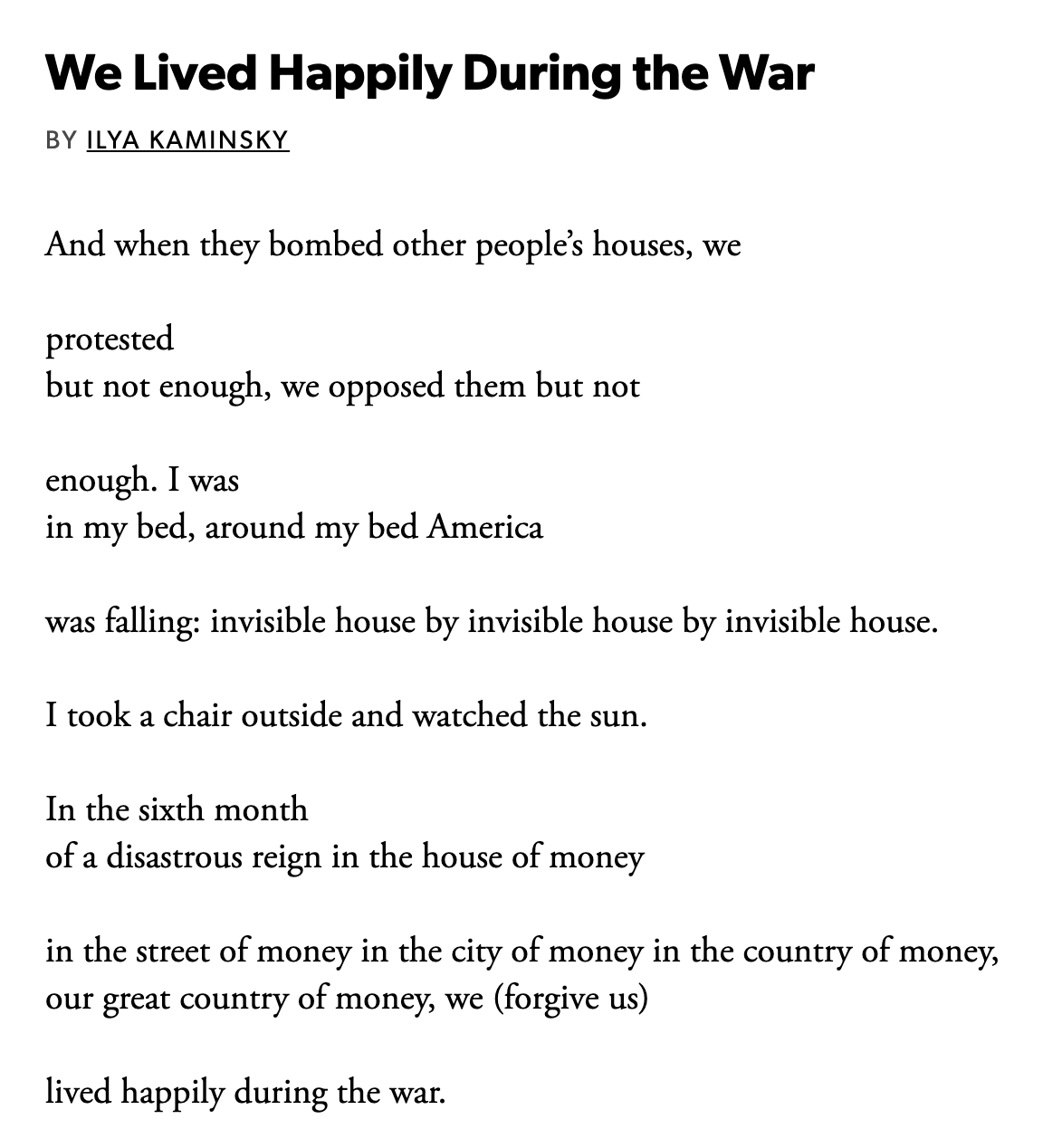
I was working on some other writing, but that had to take a backseat as, like much of the world, I’ve been caught up for the past month in what’s happening in Gaza.
I have no pre-existing emotional connection to either Israel or Palestine: I don’t have close friends from either place nor have I ever visited the region, in part because the Malaysian government doesn’t recognise Israel as a country and so prevents us citizens from visiting Israel (though one can apply for exemption to go on pilgrimage, as Christian groups have done; I’m not religious). I am a third party watching all this human violence and carnage playing out onscreen, and I have found myself unable to look away.
I’ve always been interested in how the long shadows of history play on our present—a theme I’ve also written about other conflicts, such as the Troubles in Northern Ireland—but I think, like so many others, I have not been able to help but care about Palestine for the flagrant hypocrisy the West, including its mainstream media, has shown in its oft-vaunted commitment to universal human rights (always a little suspect, but still better than most of the world, we thought), and for the fact that I’m currently in Germany, where this crisis has greater resonance because of its central role in the Holocaust. But I’ve also felt so invested in what’s happening in Gaza because of what it shows about our further deterioration of language and how we communicate with one another—through mainstream and social media, and from person to person.
I’ve been trying to write this letter for a while. The attempt has felt like a thorn in my side for the past weeks—I felt, simultaneously, like it was pointless and crucial to write about what is happening, and every time I started to document my thoughts I would soon abandon the effort, ending up scrolling and reading and listening and watching more instead, trying to make sense of the questions that continue to pile up one over another in my head, making the whole undertaking feel even more impossible. I’ve posted here and there, privately and publicly, on social media, but I’ve needed some time to clarify my thoughts further and to put some of them down more coherently here (and I’m already keeping this letter purposefully narrowed in scope).
All this is, above all, for my own record. It feels important, first on a private, personal level, to remember how I’ve reacted and to find out what I think.
I’m currently reading Palestinian writer Raja Shehadeh’s Language of War, Language of Peace (2015), in which he describes the violence done to language in order to make what’s happening to Palestinians a more palatable reality. In his introductory chapter, he writes:
The future of this small area between the Mediterranean Sea and the River Jordan is the concern of not only Israelis and Palestinians. It is a land with particular significance to many people around the world. It has been known for a long time that the key to a safer, more peaceful Middle East lies in resolving the conflict here. While it will ultimately fall upon those of us who live in this tiny contested plot to make peace possible, at the moment we cannot achieve this without the assistance of the rest of the world.
In truth, the first week after Hamas’ atrocious attacks on Israeli civilians on October 7, I wasn’t paying too much attention to the news; I had just flown back to Berlin and was traveling around Germany a bit to visit my partner’s family. And at the time, when I saw people on social media—people like me just coming to the Palestinian struggle, with a superficial understanding of the history—sharing their thoughts, much of it often felt either too reductive or too all-encompassing, paying lip service in a way that did hardly anything to advance the conversation, that could, perhaps, even be detrimental to the cause of peace. Much better to just amplify informed voices that actually help make sense of what’s happening, I thought—which was what I did, and still do, on Instagram Stories. Sometimes I would add a caption, but usually, I’ve amplified without comment, preferring to let the facts speak for themselves.
By the second week, however, as the body count of civilians continued to climb in Gaza under the Israeli government’s bombardment, with no end in sight, and it was clear that no one with the diplomatic muscle to stop the Netanyahu government was going to do so, I started to think differently. I started to feel like only popular international opinion supporting calls for a ceasefire could apply the necessary pressure to stem the hemorrhage of lives that are inexplicably still being lost. More importantly, voicing one’s opposition to Israel’s ongoing disproportionate attacks on civilians in Gaza, which many experts have said make up a good case for genocide (especially as several Israeli officials have unabashedly articulated their intentions), could embolden others to do the same, to push back against the suppression of free speech going on right now and the risk of being baldly, and wrongly, labeled “terrorist sympathizer” or “antisemitic”, which has affected even Jews criticizing the Israeli government—especially in Germany, where I’m writing from. The powers that be may be able to cancel a few voices, but they can’t cancel a crowd. And that crowd is growing.
Where the world couldn’t do anything about Hamas’ October 7 attacks on Israeli civilians because they took the world by surprise, it can, right now, do something about Israel’s bombardment of Gazan civilians. Because we are all watching in real-time as it happens, and it is clear that Israel has not been able to target Hamas militants without killing a disproportionate number of civilians, human shields or not. (I mean, if someone uses you, a civilian, as a human shield without your explicit consent, would it be fair to kill you to get to them? And if Israeli officials are making the case that they are voluntary human shields, they need to provide the evidence for it, right?) Surely, if it’s not possible to root out Hamas without killing thousands of children, then any decent, or even pragmatic, person must conclude that it can’t be done—not today? How can retribution, no matter how justified, trump the loss of such a disproportionate number of lives? Yet, it’s been more than forty days since Israel began pulverizing Gaza, and despite hundreds of thousands around the world protesting and more politicians speaking out against their governments for abstaining or voting against a “humanitarian pause” at the U.N. general assembly on October 27, the violence has only escalated and the rhetoric from Israeli officials has only become more brazen in the face of the inaction—no, the explicit backing—of Western powers.
To be persuaded by them is to believe, illogically, that there can be “no innocent civilians in Gaza”—not even children and babies apparently, because they will surely grow up to become Israeli-hating adults. Doesn’t this seem like an argument for prosecuting “thought crimes”, which can reasonably have no legitimacy and will take us down a dubious slippery slope? The same goes when they justify this line of thinking by arguing that Gazans had elected Hamas in 2006—though there are, as John Oliver points out, some qualifications to the durable truth of this statement—so they are fair game. Just turn these arguments on yourself. If you had voted for a “bad” government, for whatever reason, should you also then be punished for their crimes? Nicholas Kristof in his column, at a time when the suggestion he names was still “implicit” (it’s not anymore), wrote:
I particularly want to challenge the suggestion, more implicit than explicit, that Gazan lives matter less because many Palestinians sympathize with Hamas. People do not lose their right to life because they have odious views, and in any case, almost half of Gazans are children. Those kids in Gaza, infants included, are among the more than two million people enduring a siege and collective punishment.
As such, statements by the U.S. government to the effect that they will not put any restrictions on Netanyahu, and will instead send billions more to fund what is beginning to look more and more like Netanyahu’s personal crusade, beg disbelief. The fact that U.S. and Israeli officials continue to say that they are trying their best to prevent civilian casualties while at the same time doing the very opposite, insults our intelligence. The world sees how the Israeli officials are acting, hears what they are saying. Okay, every state—not just Israel, not just Palestine—has a right to defend itself, but can the indiscriminate killing of civilians, many of them children and babies, in good faith be described as “self-defense” or a “lawful” use of force? Hamas’ attacks on civilians, in their homes and at a music concert, cannot be justified in self-defense; neither can the Netanyahu government’s attacks on civilians who are just trying to live their lives as best as they can under siege. No cause, no matter how good, can justify targeting civilians—because, as we have seen, they are not usually the ones the aggrieved have direct quarrel with. Shouldn’t this principle apply to both sides, even as one acknowledges the asymmetries of power and suffering between them? The fact that we have seen indiscriminate force being used for supposed greater ends in history does not mean it’s okay if the same happens today.
Yes, a lot about what’s happening right now remains uncertain. So much is contested, so much “we said–they said” is being lobbed around. But what at least seems clear is the mass scale of destruction, killings, and displacement that is being wrought in Gaza, even if one were to quibble about exact numbers. And in any case, for those who feel they can’t commit to believing in any one reality because the situation is so divisive and the facts on the ground so unclear, isn’t that more reason to support calls for a ceasefire? So that various parties like international humanitarian organizations, diplomats, and journalists can be allowed to enter Gaza and begin to ascertain what’s really going on, which can’t happen when it is being carpet bombed and isolated from the rest of the world?
At the moment, we are wasting time arguing over justifications that we are not even sure are true; and in any case I would say that nothing can justify attacks on civilians—much less scorched-earth assaults as this. There are no neat answers as to what should or can come after a ceasefire, but doesn’t it seem like a reasonable first step, so further lives can be saved and so cooler heads can prevail on what should follow? The current violence only fuels the flames further and makes the world a more dangerous place—not just for Israelis and Jews and Palestinians and Muslims, but for the rest of the world.
I think some people remain hesitant to join in calls for a ceasefire because they fear they don’t know enough. But while I agree that knowledge of the historical context is necessary in terms of explaining—not justifying—both side’s positions and the crimes they’ve committed to pave the road forward with better understanding, I don’t think anyone needs to be an expert on this conflict to support a ceasefire as a bare minimum. There is no time to lose. The killing needs to stop already; it should have stopped before.
I’m persuaded that all that is required of anyone to support calls for a stop to the fighting is for them to center humanity: even if one were to just consider the latest round of hostilities without the weight of all the history—imagine if instead of Israel, we had Greenland?—surely one should, if one prioritizes human rights, come to the same conclusion? I don’t think one needs to have made up their mind about whether one group is truly “terrorist” to condemn the crimes committed by both sides or to mourn their victims. Frankly, I don’t know enough about Hamas—there is apparently a good book by Tareq Baconi, Hamas Contained—but if one were to designate it as a terrorist group, shouldn’t we say the same of Netanyahu’s government by its actions? Isn’t it enough for us to know that both sides, whatever their political designations, have committed acts of terrorism? Let’s look at what their actions really say about them, not simply at whether they’re a “good” guy or “bad” guy as designated by those in power.
We must all emphatically reject the suggestion that supporting a ceasefire means in any way supporting Hamas or terrorism—a real stretch of an idea that opportunistic politicians and extremists have so dangerously encouraged. I think one could hold more sympathies with Israel than Palestine and still echo calls for a ceasefire, simply to stop the bloodshed of innocents. The Malaysian and Singaporean governments (not that I’m holding them up as particular bastions of anything), for instance, have united in their call for a ceasefire though they differ in their foreign policy with respect to both states. It’s the bare minimum.
In thinking through all this, I’ve found this Judith Butler essay, published fairly early on amid the conflict, instructive. In it, she grapples with this question:
I ask myself whether we can mourn, without qualification, for the lives lost in Israel as well as those lost in Gaza without getting bogged down in debates about relativism and equivalence.
In short, she says: condemning the attacks on civilians, committed by both sides, is not complicated. It doesn’t require you to know what has happened in the past few decades.
But ideally, she adds: one shouldn’t stop there. The complicated part should come next—or rather, the messy part; as in a sense, it’s also not so “complicated” as they tell you. Having taken that initial moral stance, she says, one could then go on to learn about the long history of circumstances that have brought all this bloodshed about, which might then push one to take on additional stances—such as being anti-apartheid, anti-ethnic cleansing, or anti-occupation—without feeling like that would threaten the position one has already taken.
As Butler writes:
I oppose the violence that Hamas has inflicted and have no alibi to offer. When I say that, I am making clear a moral and political position. I do not equivocate when I reflect on what that condemnation presupposes and implies. Anyone who joins me in this condemnation might want to ask whether moral condemnation should be based on some understanding of what is being opposed. One might say, no, I don’t need to know anything about Palestine or Hamas to know that what they have done is wrong, and to condemn it. And if one stops there, relying on contemporary media representations, without ever asking whether they are actually right and useful, whether they let the histories be told, then one accepts a certain ignorance and trusts in the framework presented. After all, we are all busy, and we cannot all be historians or sociologists. That is a possible way to think and live, and well-intentioned people do live that way. But at what cost?
Instead, she proposes:
What if our morality and our politics did not end with the act of condemnation?
And later goes on to say:
It need not threaten our moral positions to take some time to learn about the history of colonial violence and to examine the language, narratives and frameworks now operating to report and explain—and interpret in advance—what is happening in this region. That kind of knowledge is critical, but not for the purposes of rationalising existing violence or authorising further violence. Its aim is to furnish a truer understanding of the situation than an uncontested framing of the present alone can provide. Indeed, there may be further positions of moral opposition to add to the ones we have already accepted, including an opposition to military and police violence saturating Palestinian lives in the region, taking away their rights to mourn, to know and express their outrage and solidarity, and to find their own way towards a future of freedom.
As Israel continues to bombard Gaza, I’ve been watching media interviews on the situation with some frustration. It would seem that for many people, mourning the lives lost on both sides or condemning the attacks on civilians committed by both sides is tantamount to “bothsiding”, or being “neutral”. The Israeli writer Edgar Keret told the New York Times:
But I think that the most attacked posts on the internet are those of people saying, “Oh, my god, I see people dying in Israel and I see people dying in Palestine, and it breaks my heart.” If you put up a post like that, they will rip you to pieces from both sides. And I’m saying that, in this sense, I do feel some kind of deterioration, a human deterioration.
It’s been startling to see how some supportive of Israel can decry Hamas for killing civilians on October 7, but fail to similarly decry the Netanyahu government for its equally indiscriminate killings of civilians, and in far greater numbers. As for those whose sympathies lie more with Palestine, I think many do hold that moral consistency; but pushed by many a pugnacious American news anchor to first condemn Hamas before they are allowed to even speak their minds—“to audition for empathy and compassion”, as Palestinian-American writer, Hala Alyan put it—one can understand how they might be put on the defensive and feel reluctant to play into the media’s hands, to give an inch at all to Israeli grievances when they have the world’s war machines behind them, when Palestinian grievances and suffering need more airtime as a counterweight.
Or perhaps the problem is in the imprecision of what they are being asked to condemn: is it Hamas as a whole, or is it the attacks it made on civilians on October 7? One might ask: Is there a difference? For Jeremy Corbyn, there seems to be: he condemned Hamas’ attacks but refrained from condemning Hamas itself. I puzzled over this at first, but then thought: perhaps he’s thinking that Hamas may still need to be negotiated with, so nothing can be gained from condemning them wholly as a “terrorist” group? I’m speculating, trying to make sense of what people say and don’t say, at a time when words no longer just mean what they mean. But his refusal reminded me of how former Israeli peace negotiator Daniel Levy made a comparison between Hamas and the Irish Republican Army—pointing out that the latter, despite their use of violent tactics, had eventually to be negotiated with (no matter how unsavory the thought), so that a peace deal could be reached in Northern Ireland.
Also, I don’t think that it is productive for the media to goad Palestinians themselves who have lost tens of family members in Israel’s airstrikes to first condemn Hamas before they are allowed to describe their suffering, which they must feel falls on deaf ears. I think it would be understandable if they’re not feeling too generous under the circumstances. Also, might it not endanger Palestinians for journalists to ask them to publicly condemn Hamas—if Hamas is, indeed as the West says, a murderous outfit that could come for them and their families? Such condemnations are better asked of politicians, historians, activists, or third parties like you and me, with no actual skin in what’s happening. I think Zack Beauchamp makes a persuasive point that the better role for outsiders is to help foster the belief in the possibility of the co-existence of both sides on the same land, whatever form that may take.
In the same vein, Edgar Keret, in the aforementioned interview, also spoke against the tendency to divide popular support into two camps, as if this were a team sport:
I wrote an op-ed for The New York Times a long time ago about how I don’t like the terms “pro-Israel” and “pro-Palestinian.” Because when you speak to somebody and he says that he’s pro-Israel or pro-Palestinian, then it doesn’t matter what argument you’re going to give, he’s going to stay in the same opinion.
It’s like, being “pro-Israeli,” are you pro-children dying in Gaza from bombing? The idea is that reality is complex, and, for me, the primal responsibility is a human one.
And when I see people watching the horrible tragedy that is happening here as if it were a Super Bowl of victimhood, in which you support one team and really don’t care about the other, empathy becomes very, very selective. You see only some pain. You don’t want to see other pain.
Similarly, I’ve found it unhelpful when the authorities characterize a protest in advance as “pro-Palestine” or “pro-Israel”—especially here in Germany where they are more likely to prohibit the former and when it is often equated to sympathising with Hamas or supporting terrorism—because that could scare away people who simply support a ceasefire. Even if one rightly comes to the conclusion that Israel has been the greater offender in all this and Palestinians the greater victims, and supports an end to the Israeli government’s occupation, apartheid, and ethnic cleansing of Palestinians, I think professing to simply be “pro-” one side or the other is too simplistic, because there are likely aspects of both sides one can agree or disagree with. Israel and its allies committed the “original sin” in 1948 when it forcibly expelled hundreds of thousands of Palestinians to establish Israel as a state, but in the intervening years, perhaps both sides—and their successive, different governments—bear some, even if unequal, responsibility for scuttling attempts at peace or for exacerbating the violence? As a non-expert in this (I’m still reading and learning), I’m keeping the question open in my mind. As with so many things gone wrong in our world, one can’t always turn back the clock to its root cause (some would also disagree on what the root cause is) to return everything to what it was—because it’s true that may create new injustices, or exchange one victim for another. At the same time, at least some turning back of the clock seems necessary in this case? Some reparations will need to be made, some justice will need to be done, which may require compromise from both sides?
This can be a hard pill to swallow, considering that one side seems, on the face of it, very much more the perpetrator—supported by the mightiest countries of the world—than the other. Yet, given everything that has already happened over the decades, Raja Shehadeh, in the same book I quoted from earlier, wrote that at the same time that Israelis must accept co-existence with Palestinians, Palestinians too must do the same:
What we should seek is not the destruction of Israeli society, but ways to forge a new relationship that would make it possible for both of us to have a full life based on justice and equality in this beautiful but tortured land which we share, for both of us—Palestinian Arabs and Israeli Jews—live here.
On such a highly divisive and emotional matter, it feels important to be consistent in how we respond to violations of human rights, whoever commits them or suffers from them. I understand that there is a reluctance among some to amplify any suffering of Israelis, because they have the world’s big powers behind them—support David, not Goliath, as a friend put it. And I do get that: it’s legitimate that we highlight what we feel is not highlighted. But I think we should still be ready to condemn both sides and sympathize with both sides when the facts as they are revealed call for it—if only to make the point that one need not obscure the other’s humanity to magnify one’s own. It seems self-evident, yet frequently forgotten amid the present divisiveness, to say that a group’s government doesn’t represent the entirety of its people, to say that we should be trying to see the humanity in both sides to salvage any bit of common ground. Instead of being “pro-Israel” or “pro-Palestine”, what about being pro-human rights instead? The people who really suffer in all this are civilians, on both sides.
And yet, and yet—having said all that, what exactly is the point of all these condemnations? What do they actually achieve? Yanis Varoufakis, Greece’s former Finance Minister, thinks “condemning” only makes things worse:
Why did I not take the easier route of, on the one hand, condemning Hamas and, on the other, championing the rights of Palestinians? Because I wanted to make the point that it is we, Europeans and Americans, who must be condemned. Because it is we, Europeans and Americans, who, with our patronisingly ritual moralistic condemnations (whether one-sided or equidistant), have been making Peace impossible in Israel-Palestine.
As someone who uses words to make sense of the world and to express myself, I’ve been so disheartened to watch how the “discourse” has unfolded in response to the current events. Language has become a minefield, and no matter how rational and empathetic you think you’re being, carefully laying out your arguments for the position you’re taking, someone can still completely disregard your intentions and wilfully misunderstand you. It feels like we can no longer communicate reasonably and expect to be reasonably understood. What then, is the point of words?
There seems to be a tendency to find fault with any statement—even one that, as a whole, say, supports a ceasefire, followed by an end to the violation of Palestinian human rights. Maybe the statement starts by condemning Hamas’ October 7 attacks, therefore insufficiently recognizing the context in which they took place; maybe it doesn’t start out condemning Hamas’ October 7 attacks, therefore insufficiently recognizing their savagery. It feels like this makes allyship tricky when what’s needed right now is for us to emphasize our common ground so we can change the terrible status quo. “Pro-Palestine” protesters are by no means monoliths, but broadly, they support a ceasefire to save lives. And what we need immediately is to save lives, over winning any argument.
I’ve also been trying to resist the feeling that I shouldn’t share a particular post on social media unless I can stand behind all of it, because I think you can take something important from one perspective and not agree with another part of it, and that doesn’t invalidate the whole perspective. Simply, I share things that help me, in whatever little way, make sense of what’s happening. I often post things because I find something in it that makes me wonder, Oh, what else is there to this detail?—that maybe there is something else, or another way of seeing, I haven’t considered. And I feel if we are doing it right, each new thing you read opens up another question, another connection, that adds to the bigger puzzle you’re piecing together. But when you look at social media, it can feel like everybody just wants to “teach” somebody something, everybody just wants to be told, unequivocally, how to think about a situation—and, if possible, all in one text. What happened to fact-gathering and coming to our own views of the world?
In such a climate, it’s easy to be afraid to express yourself, to err on the side of remaining silent, where you can’t be attacked. Because of this, I want to close this letter with some words from Gabor Maté, a Holocaust survivor who recently said in an interview with his daughter something that I think is worth repeating—so that we are not scared away from trying to figure out for ourselves what’s true and reasonably speaking our minds, so that we resist the urge to put words into each others’ mouths simply to score a point:
I’m responsible for what I say, I’m responsible for how I say it. I’m not responsible for how people hear it and I’m not responsible for how people interpret it—that’s on each and every one of us.
So let’s all speak with as much information as we can reasonably gather, let’s all speak with as much compassion for everybody as we can possibly muster… But let’s be responsible for not just how we speak, but also how we listen.
I’ve realized that increasingly, in the past few years, I’ve found myself qualifying, and qualifying again, things I say, to make sure they can’t be interpreted in a way I don’t intend. That’s just part of what it means to be a good communicator in our present media environment of frequent context collapse, I thought, and if someone misunderstands me, then it’s partly my fault. But that’s an impossible standard to hold oneself to, considering the very different minds one’s words travel through. So I’ve found a lot of comfort in this passage, in a way that goes beyond this current crisis. I hope it bolsters you too.
I leave you with:
In solidarity,
E.





